Quyu Kong
Long-range Modeling and Processing of Multimodal Event Sequences
Feb 01, 2026Abstract:Temporal point processes (TPPs) have emerged as powerful tools for modeling asynchronous event sequences. While recent advances have extended TPPs to handle textual information, existing approaches are limited in their ability to generate rich, multimodal content and reason about event dynamics. A key challenge is that incorporating multimodal data dramatically increases sequence length, hindering the ability of attention-based models to generate coherent, long-form textual descriptions that require long-range understanding. In this paper, we propose a novel framework that extends LLM-based TPPs to the visual modality, positioning text generation as a core capability alongside time and type prediction. Our approach addresses the long-context problem through an adaptive sequence compression mechanism based on temporal similarity, which reduces sequence length while preserving essential patterns. We employ a two-stage paradigm of pre-training on compressed sequences followed by supervised fine-tuning for downstream tasks. Extensive experiments, including on the challenging DanmakuTPP-QA benchmark, demonstrate that our method outperforms state-of-the-art baselines in both predictive accuracy and the quality of its generated textual analyses.
MAI-UI Technical Report: Real-World Centric Foundation GUI Agents
Dec 26, 2025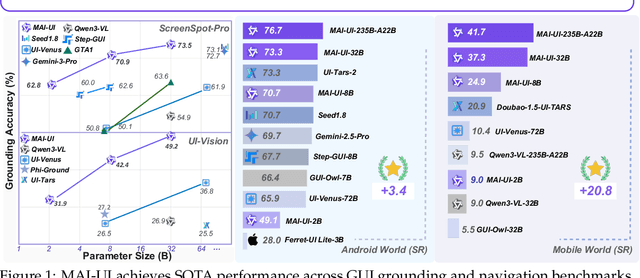
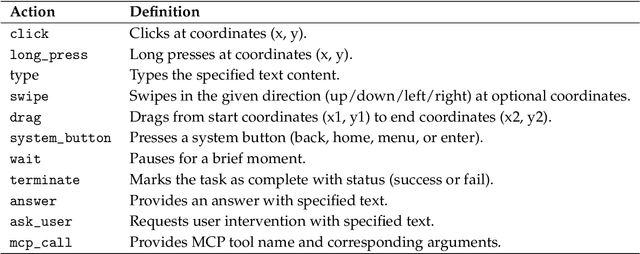
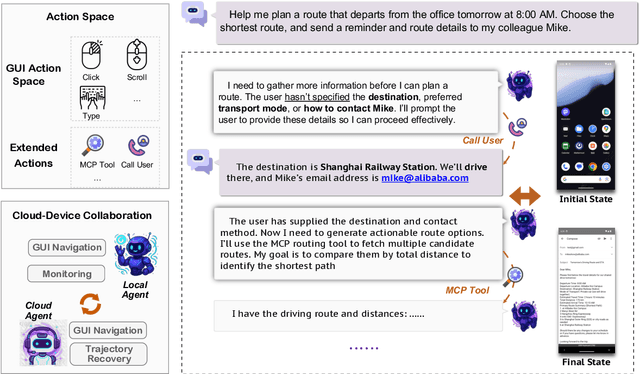
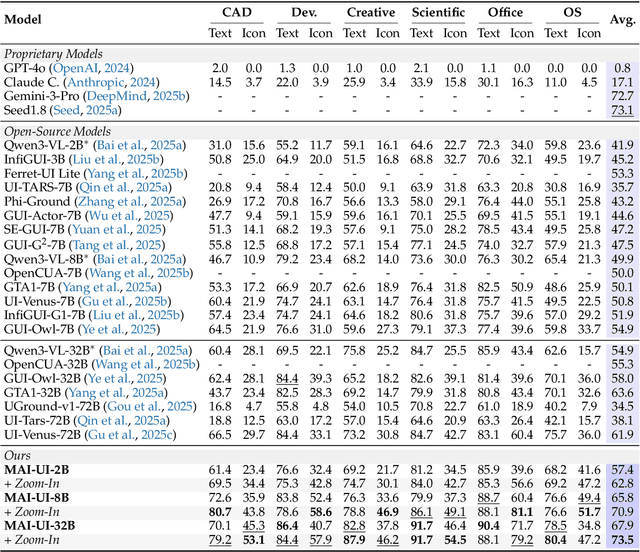
Abstract:The development of GUI agents could revolutionize the next generation of human-computer interaction. Motivated by this vision, we present MAI-UI, a family of foundation GUI agents spanning the full spectrum of sizes, including 2B, 8B, 32B, and 235B-A22B variants. We identify four key challenges to realistic deployment: the lack of native agent-user interaction, the limits of UI-only operation, the absence of a practical deployment architecture, and brittleness in dynamic environments. MAI-UI addresses these issues with a unified methodology: a self-evolving data pipeline that expands the navigation data to include user interaction and MCP tool calls, a native device-cloud collaboration system routes execution by task state, and an online RL framework with advanced optimizations to scale parallel environments and context length. MAI-UI establishes new state-of-the-art across GUI grounding and mobile navigation. On grounding benchmarks, it reaches 73.5% on ScreenSpot-Pro, 91.3% on MMBench GUI L2, 70.9% on OSWorld-G, and 49.2% on UI-Vision, surpassing Gemini-3-Pro and Seed1.8 on ScreenSpot-Pro. On mobile GUI navigation, it sets a new SOTA of 76.7% on AndroidWorld, surpassing UI-Tars-2, Gemini-2.5-Pro and Seed1.8. On MobileWorld, MAI-UI obtains 41.7% success rate, significantly outperforming end-to-end GUI models and competitive with Gemini-3-Pro based agentic frameworks. Our online RL experiments show significant gains from scaling parallel environments from 32 to 512 (+5.2 points) and increasing environment step budget from 15 to 50 (+4.3 points). Finally, the native device-cloud collaboration system improves on-device performance by 33%, reduces cloud model calls by over 40%, and preserves user privacy.
MobileWorld: Benchmarking Autonomous Mobile Agents in Agent-User Interactive, and MCP-Augmented Environments
Dec 22, 2025

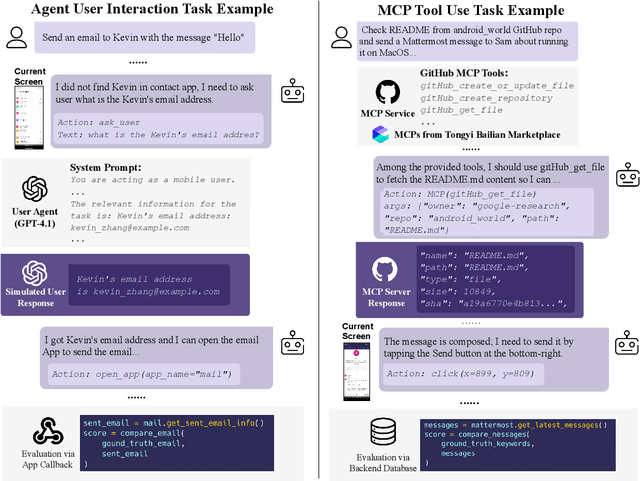

Abstract:Among existing online mobile-use benchmarks, AndroidWorld has emerged as the dominant benchmark due to its reproducible environment and deterministic evaluation; however, recent agents achieving over 90% success rates indicate its saturation and motivate the need for a more challenging benchmark. In addition, its environment lacks key application categories, such as e-commerce and enterprise communication, and does not reflect realistic mobile-use scenarios characterized by vague user instructions and hybrid tool usage. To bridge this gap, we introduce MobileWorld, a substantially more challenging benchmark designed to better reflect real-world mobile usage, comprising 201 tasks across 20 applications, while maintaining the same level of reproducible evaluation as AndroidWorld. The difficulty of MobileWorld is twofold. First, it emphasizes long-horizon tasks with cross-application interactions: MobileWorld requires nearly twice as many task-completion steps on average (27.8 vs. 14.3) and includes far more multi-application tasks (62.2% vs. 9.5%) compared to AndroidWorld. Second, MobileWorld extends beyond standard GUI manipulation by introducing novel task categories, including agent-user interaction and MCP-augmented tasks. To ensure robust evaluation, we provide snapshot-based container environment and precise functional verifications, including backend database inspection and task callback APIs. We further develop a planner-executor agentic framework with extended action spaces to support user interactions and MCP calls. Our results reveal a sharp performance drop compared to AndroidWorld, with the best agentic framework and end-to-end model achieving 51.7% and 20.9% success rates, respectively. Our analysis shows that current models struggle significantly with user interaction and MCP calls, offering a strategic roadmap toward more robust, next-generation mobile intelligence.
Fair Bayesian Data Selection via Generalized Discrepancy Measures
Nov 10, 2025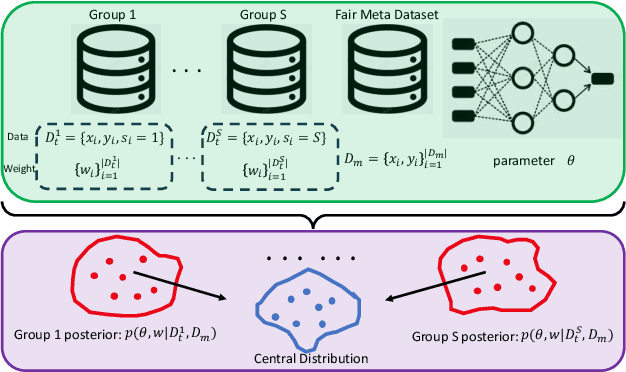
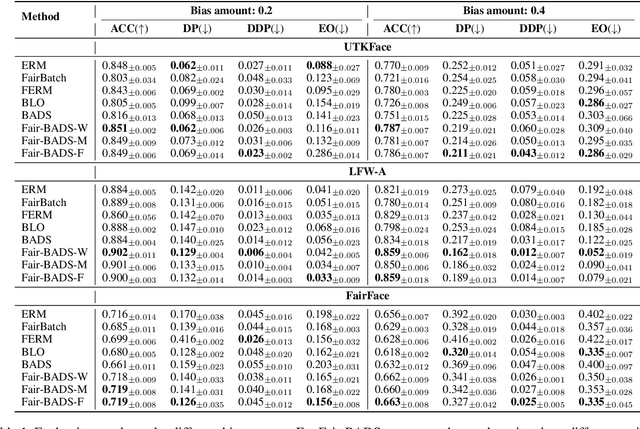

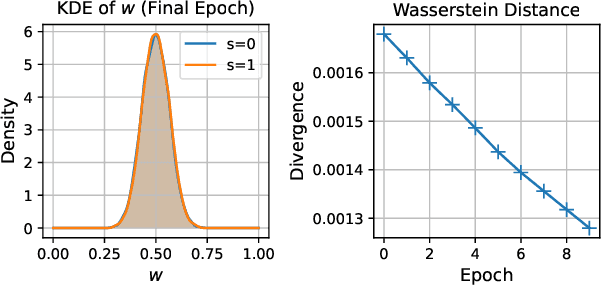
Abstract:Fairness concerns are increasingly critical as machine learning models are deployed in high-stakes applications. While existing fairness-aware methods typically intervene at the model level, they often suffer from high computational costs, limited scalability, and poor generalization. To address these challenges, we propose a Bayesian data selection framework that ensures fairness by aligning group-specific posterior distributions of model parameters and sample weights with a shared central distribution. Our framework supports flexible alignment via various distributional discrepancy measures, including Wasserstein distance, maximum mean discrepancy, and $f$-divergence, allowing geometry-aware control without imposing explicit fairness constraints. This data-centric approach mitigates group-specific biases in training data and improves fairness in downstream tasks, with theoretical guarantees. Experiments on benchmark datasets show that our method consistently outperforms existing data selection and model-based fairness methods in both fairness and accuracy.
Negative Binomial Variational Autoencoders for Overdispersed Latent Modeling
Aug 07, 2025



Abstract:Biological neurons communicate through spike trains, discrete, irregular bursts of activity that exhibit variability far beyond the modeling capacity of conventional variational autoencoders (VAEs). Recent work, such as the Poisson-VAE, makes a biologically inspired move by modeling spike counts using the Poisson distribution. However, they impose a rigid constraint: equal mean and variance, which fails to reflect the true stochastic nature of neural activity. In this work, we challenge this constraint and introduce NegBio-VAE, a principled extension of the VAE framework that models spike counts using the negative binomial distribution. This shift grants explicit control over dispersion, unlocking a broader and more accurate family of neural representations. We further develop two ELBO optimization schemes and two differentiable reparameterization strategies tailored to the negative binomial setting. By introducing one additional dispersion parameter, NegBio-VAE generalizes the Poisson latent model to a negative binomial formulation. Empirical results demonstrate this minor yet impactful change leads to significant gains in reconstruction fidelity, highlighting the importance of explicitly modeling overdispersion in spike-like activations.
DanmakuTPPBench: A Multi-modal Benchmark for Temporal Point Process Modeling and Understanding
May 23, 2025Abstract:We introduce DanmakuTPPBench, a comprehensive benchmark designed to advance multi-modal Temporal Point Process (TPP) modeling in the era of Large Language Models (LLMs). While TPPs have been widely studied for modeling temporal event sequences, existing datasets are predominantly unimodal, hindering progress in models that require joint reasoning over temporal, textual, and visual information. To address this gap, DanmakuTPPBench comprises two complementary components: (1) DanmakuTPP-Events, a novel dataset derived from the Bilibili video platform, where user-generated bullet comments (Danmaku) naturally form multi-modal events annotated with precise timestamps, rich textual content, and corresponding video frames; (2) DanmakuTPP-QA, a challenging question-answering dataset constructed via a novel multi-agent pipeline powered by state-of-the-art LLMs and multi-modal LLMs (MLLMs), targeting complex temporal-textual-visual reasoning. We conduct extensive evaluations using both classical TPP models and recent MLLMs, revealing significant performance gaps and limitations in current methods' ability to model multi-modal event dynamics. Our benchmark establishes strong baselines and calls for further integration of TPP modeling into the multi-modal language modeling landscape. The code and dataset have been released at https://github.com/FRENKIE-CHIANG/DanmakuTPPBench
Grounding 3D Object Affordance with Language Instructions, Visual Observations and Interactions
Apr 07, 2025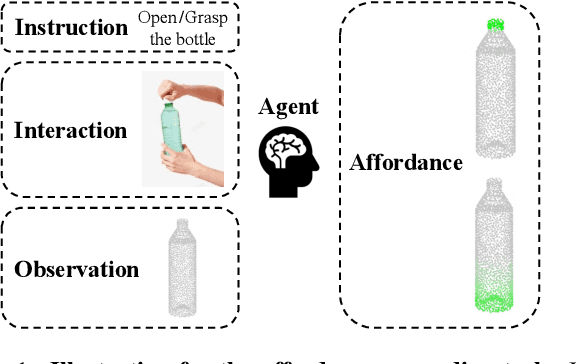

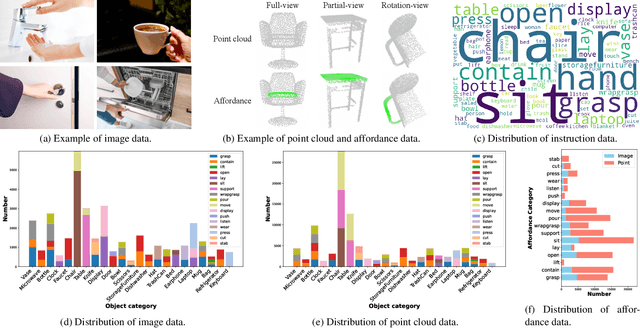

Abstract:Grounding 3D object affordance is a task that locates objects in 3D space where they can be manipulated, which links perception and action for embodied intelligence. For example, for an intelligent robot, it is necessary to accurately ground the affordance of an object and grasp it according to human instructions. In this paper, we introduce a novel task that grounds 3D object affordance based on language instructions, visual observations and interactions, which is inspired by cognitive science. We collect an Affordance Grounding dataset with Points, Images and Language instructions (AGPIL) to support the proposed task. In the 3D physical world, due to observation orientation, object rotation, or spatial occlusion, we can only get a partial observation of the object. So this dataset includes affordance estimations of objects from full-view, partial-view, and rotation-view perspectives. To accomplish this task, we propose LMAffordance3D, the first multi-modal, language-guided 3D affordance grounding network, which applies a vision-language model to fuse 2D and 3D spatial features with semantic features. Comprehensive experiments on AGPIL demonstrate the effectiveness and superiority of our method on this task, even in unseen experimental settings. Our project is available at https://sites.google.com/view/lmaffordance3d.
Language-TPP: Integrating Temporal Point Processes with Language Models for Event Analysis
Feb 11, 2025



Abstract:Temporal Point Processes (TPPs) have been widely used for event sequence modeling, but they often struggle to incorporate rich textual event descriptions effectively. Conversely, while Large Language Models (LLMs) have been shown remarkable capabilities in processing textual data, they lack mechanisms for handling temporal dynamics. To bridge this gap, we introduce Language-TPP, a unified framework that integrates TPPs with LLMs for enhanced event sequence modeling. Language-TPP introduces a novel temporal encoding mechanism that converts continuous time intervals into specialized byte-tokens, enabling seamless integration with standard LLM architectures. This approach allows Language-TPP to achieve state-of-the-art performance across multiple TPP tasks, including event time prediction, type prediction, and intensity estimation, on five datasets. Additionally, we demonstrate that incorporating temporal information significantly improves the quality of generated event descriptions.
Advances in Temporal Point Processes: Bayesian, Deep, and LLM Approaches
Jan 24, 2025Abstract:Temporal point processes (TPPs) are stochastic process models used to characterize event sequences occurring in continuous time. Traditional statistical TPPs have a long-standing history, with numerous models proposed and successfully applied across diverse domains. In recent years, advances in deep learning have spurred the development of neural TPPs, enabling greater flexibility and expressiveness in capturing complex temporal dynamics. The emergence of large language models (LLMs) has further sparked excitement, offering new possibilities for modeling and analyzing event sequences by leveraging their rich contextual understanding. This survey presents a comprehensive review of recent research on TPPs from three perspectives: Bayesian, deep learning, and LLM approaches. We begin with a review of the fundamental concepts of TPPs, followed by an in-depth discussion of model design and parameter estimation techniques in these three frameworks. We also revisit classic application areas of TPPs to highlight their practical relevance. Finally, we outline challenges and promising directions for future research.
Integration-free Training for Spatio-temporal Multimodal Covariate Deep Kernel Point Processes
Oct 09, 2023Abstract:In this study, we propose a novel deep spatio-temporal point process model, Deep Kernel Mixture Point Processes (DKMPP), that incorporates multimodal covariate information. DKMPP is an enhanced version of Deep Mixture Point Processes (DMPP), which uses a more flexible deep kernel to model complex relationships between events and covariate data, improving the model's expressiveness. To address the intractable training procedure of DKMPP due to the non-integrable deep kernel, we utilize an integration-free method based on score matching, and further improve efficiency by adopting a scalable denoising score matching method. Our experiments demonstrate that DKMPP and its corresponding score-based estimators outperform baseline models, showcasing the advantages of incorporating covariate information, utilizing a deep kernel, and employing score-based estimators.
 Add to Chrome
Add to Chrome Add to Firefox
Add to Firefox Add to Edge
Add to Edge